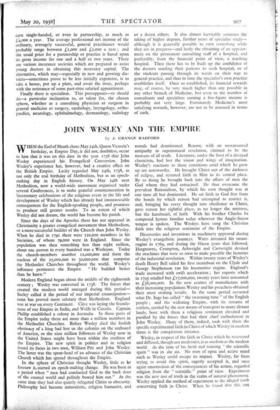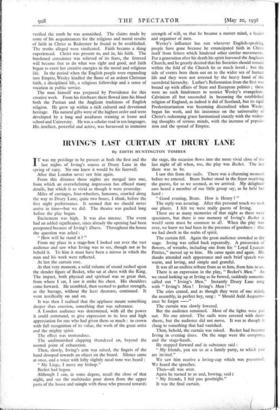JOHN WESLEY AND THE EMPIRE
By J. GRANGE RADFORD WHEN the Earl of Meath chose May 24th, Queen Victoria's birthday, as Empire Day, it did not, doubtless, occur to him that it was on this date in the year 1738 that John Wesley experienced his Evangelical Conversion. John Wesley's experience has, however, had a creative effect on the British Empire. Lecky regarded May 24th, 1738, as not only the real birthday of Methodism, but as an epoch- making day in English history. On May 24th next Methodism, now a world-wide movement organised under several Conferences, is to make grateful commemoration in bicentenary celebrations of the religious event in the life and development of Wesley which has already had immeasurable consequences for the English-speaking people, and promises to produce still greater results. To an extent of which Wesley did not dream, the world has become his parish.
Since the days of the Apostles there has not appeared in Christianity a greater evangelical movement than Methodism, or a more successful builder of the Church than John Wesley. When he died in 1791 there were 120,000 members in his Societies, of whom 79,000 were in England. Since the population was then something less than eight million, about one. person in every hundred was a Wesleyan. Today the church-members number 12,000,000 and form the nucleus of the 25,000,000 to 30,000,000 that comprise the Methodist Churches throughout the world. Wesley's influence permeates the Empire. " He builded better than he knew."
Modern England began about the middle of the eighteenth century ; Wesley was converted in 5738. The forces that created the modern world emerged during this period— Seeley called it the period of our imperial emancipation— none has proved more salutary than Methodism. England was at war on every Continent. Clive was laying the founda- tions of our Empire in India, and Wolfe in Canada. Captain Phillip established a colony in Australia. In these parts of the Empire today there are more than a million members in the Methodist Churches. Before Wesley died the foolish obstinacy of a king had lost us the colonies on the seaboard of America, or the nine million followers of Wesley now in the United States might have been within the confines of the Empire. The new spirit in politics and in religion found its focus in two men, William Pitt and John Wesley. The latter was the spear-head of an advance of the Christian Church which his spread throughout the Empire.
In the sphere of Christian thought Wesley, little as he foresaw it, started an epoch-making change He was born in a period when " men had conducted God to the back door of the created world and politely bowed him out." At the same time they had also quietly relegated Christ to obscurity. Philosophy had become naturalistic, religion humanist, and morals had deteriorated. Reason, with an unwarranted antipathy to supernatural revelation, claimed to be the measure of all truth. Literature, under the frost of a decayed classicism, had lost the vision and wings of imagination. Wesley's reactions to these conditions amid which he grew up are noteworthy. He brought Christ out of the darkness of eclipse, and restored faith in Him to its central place. By so doing he brought back into the affairs of men the God whom they had ostracised. He thus overcame the prevalent Rationalism, by which his own thought was at one time all but dominated. He set faith in God free from the bonds by which reason had attempted to restrict it, and, bringing his every thought into obedience to Christ, gave reason her rightful place, as no longer the mistress, but the handmaid, of faith. With his brother Charles he composed hymns familiar today wherever the Anglo-Saxon tongue is spoken. The Wesleys have sung the Christian faith into the religious sentiment of the Empire.
Discoveries and inventions in machinery appeared during Wesley's evangelistic journeys. Watts invented his steam- engine in 1769, and during the fifteen years that followed, Hargreaves, Crompton, Arkwright and Cartwright devised the machines that were so soon to make possible the factories of the industrial revolution. Within twenty years of Wesley's death Henry Bell sailed his first steamboat on the Clyde and George Stephenson ran his locomotive engine. England's trade increased with swift acceleration ; her exports which in 1793 totalled but L17,000p00, twenty years later amounted to £58,000,000. In the new centres of manufacture with their increasing populations Wesley and his preachers obtained their most striking results. In the same period occurred what Dr. Inge has called " the swarming time " of the English people ; and the widening Empire, with its streams of settlers, carried by the new means of transport to many distant lands, bore with them a religious sentiment elevated and purified by the forces that had their chief embodiment in John Wesley. Many of them, indeed, took with them the specific experimental faith in Christ of which Wesley in modern times is the conspicuous instance.
Wesley, in respect of the faith in Christ which he recovered and diffused, though not modernist, is as modern as the modern world. At the time of his birth and training " the scientific spirit " was in the air. No man of open and active mind such as Wesley could escape its impact. Wesley, far from trying to avoid this spirit, eagerly accepted it, and once again unconscious of the consequences of his action, regarded religion from the " scientific " point of view. Experiment was the new test of truth in the realm of natural phenomena. Wesley applied the method of experiment to the alleged truth concerning faith in Christ. When he found that this test verified the truth he was astonished. The claims made by some of his acquaintances for the religious and moral results of faith in Christ as Redeemer he found to be established. The truths alleged were vindicated. Faith became a thing experienced. Christ was present to, and in, his faith. The burdened conscience was relieved of its fears, the fettered will became free to do what was right and good, and faith began to exert her creative energies in the moral and religious life. In the period when the English people were expanding into Empire, Wesley kindled the flame of an ardent Christian faith, a disciplined life, a religious fellowship and a sense of vocation in public service.
The man himself was prepared by Providence for this creative work. From his forebears there flowed into his blood both the Puritan and the Anglican traditions of English religion. He grew up within a rich cultural and devotional heritage. His natural gifts were of the highest order and were developed by a long and assiduous training at home and school and University. He was a scholar read in ten languages. His intellect, powerful and active, was harnessed to immense strength of will, so, that he became a master mind, a leader and organiser of men.
Wesley's influence has run wherever English-speaking people have gone because he emancipated faith in Christ itself from fetters which hindered other similar movements. For a generation after his death his spirit leavened the Anglican Church, and he greatly desired that his Societies should remain within the fold of the Church he so much loved ; but the tide of events bore them out on to the wider sea of human life and they were not arrested by the heavy hand of the sacerdotal hierarchy. Luther's Reformation from the first was bound up with affairs of State and European politics ; there were no such hindrances to restrict Wesley's evangelism. Calvinism all but succeeded in becoming the established religion of England, as indeed it did of Scotland, but its rigid Predestinarianism was becoming discredited when Wesley began his work, and his insistence on the universality of Christ's redeeming grace harmonised exactly with the widen- ing thoughts of serious minds, with the increase of popula- tion and the spread of Empire.



















































 Previous page
Previous page